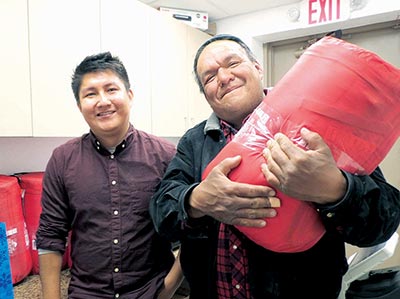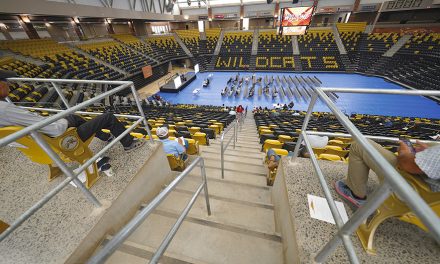
Off to a sober start in Albuquerque

Special to the Times | Colleen Keane Raymond Van Lee, Jr., Diné from Shiprock, shows his appreciation when Michael Sam, an AmeriCorps VISTA volunteer for the All Nations Wellness Center, offers him a sleeping bag.
ALBUQUERQUE

Special to the Times | Colleen Keane
Raymond Van Lee, Jr., Diné from Shiprock, shows his appreciation when Michael Sam, an AmeriCorps VISTA volunteer for the All Nations Wellness Center, offers him a sleeping bag.
Raymond Lee, Diné, from Shiprock, has a jovial smile and a sincere way of getting his point across.
His name is memorable, too, because he makes sure you get it right.
“It’s Raymond Van Lee, Jr.,” he says with an ample smile as he throws his shoulders back and stands at attention, a clue that he’s a United States veteran.
When asked, he grabs for his backpack that’s tucked under a chair and pulls out his U.S. Marine Corps cap that he wore when stationed in Iraq.
“I was in charge of communications,” he says proudly.
Lee followed his father’s, brothers’ and sisters’ footsteps, all who served in the U.S. military during different conflict periods dating back to the Vietnam era.
Like many veterans, the aftermath of war took a toll on Lee. Battling an alcohol addiction, Lee is homeless in the city.
“Drinking messes up everything,” he admits.
But, on the day before New Year’s Eve, Lee took a step to change that.
He participated in a community sobriety event at the All Nations Wellness Center on Zuni Blvd.
“Today was wonderful,” he says, his smile widening.
Last Friday, several dozen locals showed up for the event; some were there to fortify their pledge to remain sober or to make that first promise, while others attended to demonstrate their support.
“We know during the New Year celebrations, (people who are trying to maintain sobriety) go through rough times. We wanted to promote an environment where they feel safe and be away from those negative factors in their lives. Hopefully this will encourage them to stay strong,” said Michael Sam, Diné, an AmeriCorps VISTA Volunteer, who organized the event.
As a Native American-sponsored program, the event provided a cultural approach to sobriety that included a traditional activity, a string design called the Navajo Rug; presentations from inspirational speaker Ervin Tsosie, Diné, and storyteller and flute player Andrew Thomas, Diné; Navajo coyote stories; along with a dinner of scrumptious chili stew and oven bread.
“We think as tribal members, they will be able to relate more to a cultural, holistic approach to sobriety rather than the Western medical model of intervention,” explained Sam.
During his presentation, Tsosie told the group gathered in the large meeting room how this approach worked for him when he was struggling with maintaining sobriety.
After having bad experiences with church-based programs, he said he couldn’t listen to religious takes any longer.
“I was automatically against it,” he recalled.
But then he re-discovered the spiritual approach to a harmonious life.
To read the full article, pick up your copy of the Navajo Times at your nearest newsstand Thursday mornings!
Are you a digital subscriber? Read the most recent three weeks of stories by logging in to your online account.







 Highway 264,
Highway 264, I-40, WB @ Winslow
I-40, WB @ Winslow